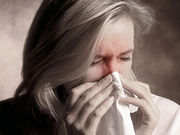Firefighters exposed to dust right after the attack or for long periods later more likely to need surgery
FRIDAY, April 8, 2016 (HealthDay News) — Sinus surgery is more common among firefighters who responded during the first two days of the World Trade Center disaster than those who had less intense or shorter exposures, according to a study published online April 8 in the Annals of the American Thoracic Society. The same was found to be true for those firefighters who were at the site for six months or more.
Researchers analyzed the medical records of 8,227 firefighters who worked at the Trade Center site and found that over 13.5 years, 1,907 developed chronic rhinosinusitis (CRS) and 479 had surgery for the condition.
Firefighters who responded during the first two days of the 9/11 disaster were 45 percent more likely to need surgery for CRS than those who responded on the third day, when rain reduced air pollution levels, the researchers found. Firefighters who worked at the site for six months or more were 48 percent more likely to need surgery for CRS than those who worked at the site for one month. The researchers also found that firefighters who needed surgery for CRS had higher levels of eosinophils even before they worked at the Trade Center site.
“Approximately five years after the towers collapsed, we began seeing more and more sinusitis and that has continued unabated to this day,” senior author Michael Weiden, M.D., said in a journal news release. Weiden is an associate professor of medicine and environmental medicine at New York University and a New York City Fire Department medical officer. Weiden said the startling finding is that those who did not respond well to medication were “different immunologically before 9/11 than those who did.” He added that treating those with high eosinophil levels earlier, more intensively or with different medicines might help them avoid surgery.
Full Text
Copyright © 2016 HealthDay. All rights reserved.








